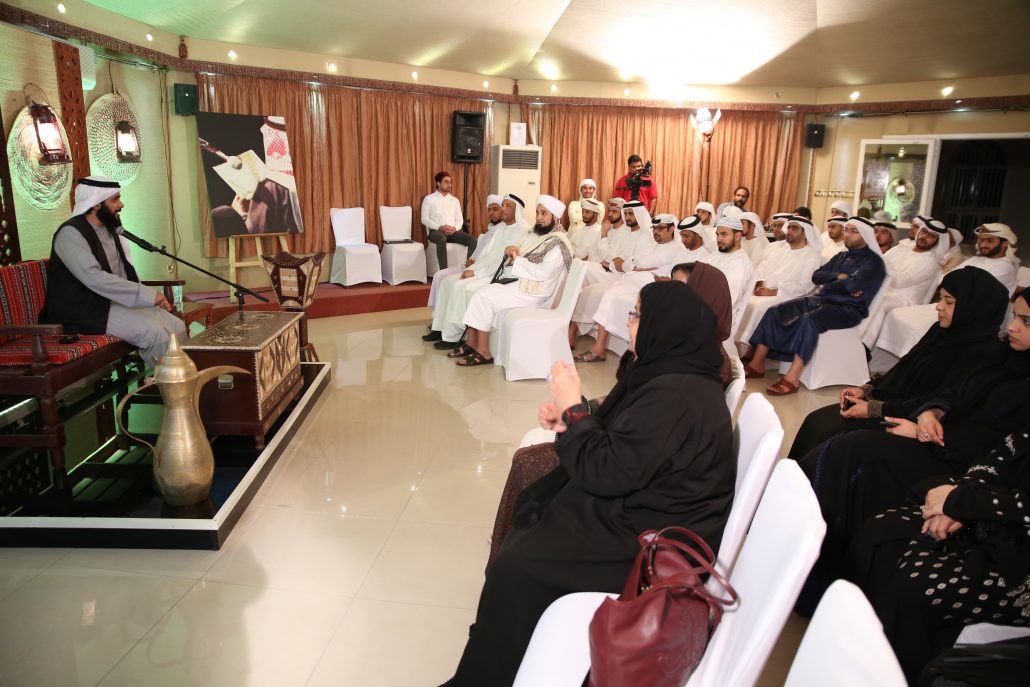In the atmosphere of love and tolerance that the United Arab Emirates experiences on the occasion of the Prophet’s blessed birthday s, the Tabah Foundation held a presentation entitled “The Prophet’s Birthday s: The Ardour of the Emirates” in the Capital Abu Dhabi, given by researcher and poet Thāni al-Muhairī. He presented works of art expressing aspects of the Prophet’s birthday s by artist Saif ‘Ali as-Sādah.
In attendance at al-Muhairī’s presentation was Chairman al-Ḥabīb ‘Alī al-Jifrī, along with several other notables, and a number of youth ardent for this momentous occasion celebrated throughout the Islamic World. He started by looking at scholarly works dealing with the blessed biography of the Prophet s, and finished his roundup by looking at works authored specifically about the Prophet’s birthday (Mawlid) s beginning from the Fourth Century AH. He showed that the Mālikī scholars have over a hundred compositions that are recited on this blessed occasion, some of which are mentioned by the Imām and Ḥadīth scholar ‘Abd al-Ḥayy al-Kattānī (d. 1962 CE) in his book, at-Ta’ālīf al-Mawlidiyyah, in which he relates the works that have been authored in this field by the great legal and Ḥadīth scholars of the Muslim Community through the centuries. Such include al-Ḥāfiẓ Ibn al-Jawzī al-Ḥanbalī, al-Ḥāfiẓ al-‘Irāqī in his book al-Mawrid al-Hanī, al-Ḥāfiẓ al-Sakhāwī, and others.
Scholars have found it fitting to celebrate the Mawlid since it was first instituted by King Muẓẓafar of Irbil, the son-in-law of the victorious Sultan Ṣalāḥu’d-Dīn al-Ayyūbī, and one of his chosen few. Al-Ḥāfiẓ Ibn Kathīr said in praise of him that he was, “One of the great, magnanimous rulers, and the majestic kings. He had a positive legacy … He used to observe the blessed birthday in Rabī‘ al-Awwal, and celebrate it in a most tremendous fashion. Nevertheless, he was a chivalrous, courageous and ferocious champion, as well as an intelligent and just scholar, may God have mercy on him and be gracious to him in his final abode.” The Mawlid he held was attended by a group of legal and Ḥadīth scholars (Muḥaddithīn and Ḥuffāẓ) and they approved of it, among them Sheikh Dār al-Ḥadīth al-Ashrafiyyah, the Muḥaddith, Abū Shāmah al-Maqdasī (d. 655 AH), may God have mercy upon him.
The people of the Emirates have also contributed to this authorship. The Sheikh ‘Abdullāh Bin Muḥammad Bin Ṣāliḥ al-Khazrajī put the evidences for the Mawlid of Imām al-Barzanjī into poetry, naming it, al-Shāhid al-Munjī li’l-Mawlid al-Barzanjī. Sheikh ‘Abdullāh studied with his paternal uncle, Sheikh Ḥasan al-Khazrajī in Dubai, and he authored a number of works in various branches of Sacred Knowledge. Other scholars, such as the Sheikh and Minister Muḥammad al-Khazrajī authored a treatise concerning the legal ruling upon celebrating the Mawlid. Also included are the Sheikh and Muḥaddith Aḥmad Bin Sheikh Muḥammad Nūr Bin Saif al-Muhairī and Sheikh ‘Īsā Bin ‘Abdullāh Bin Māni‘ al-Ḥumairī, and others.
Al-Muhairī also reviewed the notables who used to celebrate the Prophet’s birthday s in the Emirates, starting from the Emirate of Abu Dhabi and going through the various emirates, finishing with the Emirate of Fujairah. The dignitaries and sheikhs of Abū Dhabi and Dubai were wont to celebrate the Prophet’s birthday s every year. Among the most important gatherings in the Emirate of Abu Dhabi, after the Gathering of Āl Nahyān held by Sheikh Shakhbūṭ and Sheikh Zayed Bin Sultan (may God have mercy on them both) in Qaṣr al-Ḥoṣn, were the Gathering of Āl Ḥāmid, the Gathering of al-‘Utaibāt, the Gathering of H.E. Ahmad Bin Khalifa al-Suwaidi, the late Omeir Bin Youssef, and Justice ‘Alī Bin ‘Abdu’r-Raḥmān Āl Ḥāshim.
He noted that in the eighties, many of the stewards of the Mawlid in Abu Dhabi passed away. They used to celebrate it in a distinct and unique fashion – the likes of the late Sheikh Muḥammad Bin ‘Abdullāh al-Qamzī, Sayyid ‘Abdu’r-Raḥīm al-Hāshimī, the Judge of Abū Dhabi, and the distinguished poet ‘Abdullāh Bin Sulayem al-Falāsī. Also amongst them was Sheikh Jābir Bin Rashed al-Hameli, Thani Bin Murshid al-Romaithi, Rāshid Bin Khalaf al-‘Utaibah, Darwīsh Bin Karam, and others. Some groups kept this classical style alive, and the Hāshimī descendants of the Prophet s continue to pass it down, preserving this legacy.
He also mentioned the families that celebrate the Mawlid in the Emirate of Dubai, such as Āl Mejren and al-Futtaim, as well as some of its stewards, such as Sheikh ‘Abdu’r-Raḥīm al-Murīd and Sheikh Aḥmad Bin Ḥāfiẓ.
The Women’s Mawlid
In addition to the Mawlid celebrated by the men, some of the women also celebrate it in the Emirates of Abu Dhabi and Dubai, specifically the gatherings of some of the Ladies (Sheikhas) and particular families. Amongst the matriarchs famous for celebrating the Mawlid in the Emirate of Abu Dhabi is Zulaikhah Bint Sheikh Abū Dhīnah.
Mawlid after the Unification of the Emirates
The Prophet’s blessed birthday s is considered an official holiday in the United Arab Emirates, and the government has undertaken the patronage of this great event, holding celebrations in its honour. The Ministry of Islamic Affairs and Endowments holds a celebration of the Mawlid every year, attended by Sheikhs and dignitaries, just as the Department of Islamic Affairs and Charity Work does in Dubai.
The historical information presented made a great impression upon the attendees, as did the feeling of pride and belonging to a nation whose very basis is the love and tolerance inherent in the identity of its people. Amongst the comments, Dr. Hessah Lootah, Professor of Media at UAE University said, “…it is an essential part of our culture and heritage such that we cannot conceive of a wedding without a celebration of the Mawlid”. The evening was concluded with a prayer for the Muslims of the world, and humanity in general, for the advent of love and peace, along with a donation of the reward for reciting Sūrah al-Fātiḥah to the soul of Sheikh Zayed Āl Nahyān, may God have mercy upon him.



